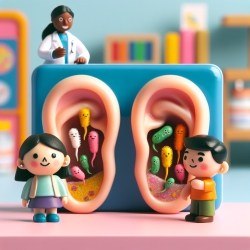The landscape of educational and therapeutic support for individuals with cognitive impairments is rapidly evolving, thanks to advancements in smart assistive technology. One such innovation is the COOK system, a Cognitive Orthosis for Cooking, designed to aid those with traumatic brain injuries (TBI) in safely and independently preparing meals. This blog explores the findings of a recent user experience study on COOK and offers insights into how educators and therapists can leverage these technologies to enhance their practice.
The Promise of Assistive Technology
Individuals who have sustained a traumatic brain injury often face long-term challenges that affect their independence in daily activities. Meal preparation, which requires complex cognitive functions such as planning and multitasking, can be particularly daunting. Smart assistive technologies like COOK offer a promising solution by providing structured guidance and safety features that empower users to engage in cooking tasks independently.
User Experience Study: Key Findings
The study titled "Smart Assistive Technology for Cooking for People With Cognitive Impairments Following a Traumatic Brain Injury: User Experience Study" highlights several critical insights:
- User-Centric Design: The development of COOK involved extensive usability testing with both experts and end-users. This approach ensured that the technology was not only functional but also user-friendly and engaging.
- Usability Improvements: Participants identified usability issues such as navigation inconsistencies and technical bugs. Addressing these concerns led to enhancements that improved the overall user experience.
- Environmental Considerations: Factors like kitchen space availability and the presence of pets were noted as important considerations for implementing COOK in home environments.
- User Feedback: Participants expressed appreciation for COOK's ability to reduce at-risk situations and provide meal planning assistance, indicating a high level of acceptance and perceived usefulness.
Implementing Smart Technology in Educational Settings
For educators and therapists working with individuals with cognitive impairments, integrating smart assistive technologies can significantly enhance therapeutic outcomes. Here are some steps practitioners can take:
- Stay Informed: Keep abreast of the latest research and developments in assistive technology through conferences, webinars, and publications.
- User Training: Provide comprehensive training sessions for users to familiarize them with new technologies. Tailor training to individual needs to ensure effective adoption.
- Create Support Networks: Establish support groups or forums where users can share experiences and tips on using assistive technologies effectively.
- Elicit Feedback: Regularly gather feedback from users to identify areas for improvement and ensure that the technology continues to meet their needs.
The Path Forward
The integration of smart assistive technologies like COOK into educational and therapeutic settings holds immense potential for enhancing independence and quality of life for individuals with cognitive impairments. By embracing these innovations, practitioners can provide more personalized support and empower their clients to achieve greater autonomy in daily living activities.
If you're interested in exploring this topic further, consider diving deeper into the original research paper: Smart Assistive Technology for Cooking for People With Cognitive Impairments Following a Traumatic Brain Injury: User Experience Study.










